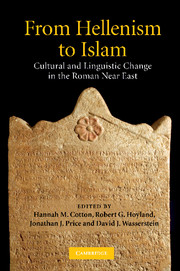Book contents
- Frontmatter
- Contents
- List of figures
- List of tables
- List of contributors
- Preface
- List of abbreviations
- Introduction: documentary evidence, social realities and the history of language
- Part I THE LANGUAGE OF POWER: LATIN IN THE ROMAN NEAR EAST
- Part II SOCIAL AND LEGAL INSTITUTIONS AS REFLECTED IN THE DOCUMENTARY EVIDENCE
- 3 Euergetism in Josephus and the epigraphic culture of first-century Jerusalem
- 4 Legal and social status of threptoi and related categories in narrative and documentary sources
- 5 Ritual performances of divine justice: the epigraphy of confession, atonement, and exaltation in Roman Asia Minor
- 6 Continuity of Nabataean law in the Petra papyri: a methodological exercise
- Part III THE EPIGRAPHIC LANGUAGE OF RELIGION
- Part IV LINGUISTIC METAMORPHOSES AND CONTINUITY OF CULTURES
- Part V GREEK INTO ARABIC
- Index
5 - Ritual performances of divine justice: the epigraphy of confession, atonement, and exaltation in Roman Asia Minor
Published online by Cambridge University Press: 01 March 2010
- Frontmatter
- Contents
- List of figures
- List of tables
- List of contributors
- Preface
- List of abbreviations
- Introduction: documentary evidence, social realities and the history of language
- Part I THE LANGUAGE OF POWER: LATIN IN THE ROMAN NEAR EAST
- Part II SOCIAL AND LEGAL INSTITUTIONS AS REFLECTED IN THE DOCUMENTARY EVIDENCE
- 3 Euergetism in Josephus and the epigraphic culture of first-century Jerusalem
- 4 Legal and social status of threptoi and related categories in narrative and documentary sources
- 5 Ritual performances of divine justice: the epigraphy of confession, atonement, and exaltation in Roman Asia Minor
- 6 Continuity of Nabataean law in the Petra papyri: a methodological exercise
- Part III THE EPIGRAPHIC LANGUAGE OF RELIGION
- Part IV LINGUISTIC METAMORPHOSES AND CONTINUITY OF CULTURES
- Part V GREEK INTO ARABIC
- Index
Summary
SAXA LOQUUNTUR: THE EPIGRAPHY OF ORAL PERFORMANCE
Stones speak. And until the invention of a time machine allows us to observe ritual actions in antiquity as eye-witnesses, it is the petrified voices of stones that we will have to listen to. Sometimes they captured loud voices in the context of ritual performances, as in the case of an inscription from Lydia:
Great is the Mother of Mes Axiottenos.
Glykon, the son of Apollonios, and Myrtion, the wife of Apollonios, (set up) this praise [eulogia] for Mes Ouranios and for Mes of Artemidoros who rules over Axiotta, for their rescue and for that of their children.
For you, Lord, have shown mercy, when I was a captive.
Great is your holiness! Great is your justice! Great is your victory! Great your punishing power! Great is the Dodekatheon that has been established in your vicinity!
For the son of my brother Demainetos made me his captive.
For I had neglected my own affairs and helped you, as if you were my own son. But you locked me in and kept me a captive, as if I were a criminal and not your paternal uncle!
Now, great is Mes, the ruler over Axiotta!
You have given me satisfaction. I praise you.
Although this inscription characterises itself as ‘praise’ (eulogia), its affinity to a group of inscriptions commonly labelled ‘confession inscriptions’ (‘Beichtinschriften’) is obvious. The term ‘confession inscriptions’ designates a continually growing group of documents from Lydia and Phrygia (first to third centuries CE) written on stone stelae and set up in sanctuaries.
- Type
- Chapter
- Information
- From Hellenism to IslamCultural and Linguistic Change in the Roman Near East, pp. 115 - 153Publisher: Cambridge University PressPrint publication year: 2009
- 10
- Cited by

